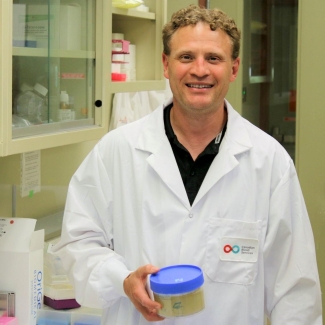Paving the way to improved transplantation and new therapeutics
Thursday, January 11, 2024 Dr. Travis Sztainert
This blog was written with the assistance of Canadian Blood Services senior development scientist Dr. Nicolas Pineault and research scientist Dr. Harinad Maganti.
Hematopoietic stem cells (HSCs) play a pivotal role in replenishing our blood and immune systems and transplantation of HSCs can be used in the treatment of various diseases like leukemia, lymphoma, and other blood disorders. However, obtaining a sufficient number to ensure successful engraftment (the process where the cells begin to multiply in the bone marrow of a transplant recipient) and recovery can be challenging, especially when the cells are collected from cord blood. A recent study, exploring the expansive world of HSC biology, has unveiled promising discoveries in the expansion of these critical cells.
Conducted by a team of scientists including Canadian Blood Services senior development scientist Nicolas Pineault, as well as research scientist Harinad Maganti (a postdoctoral researcher at the time), postdoctoral researcher Javed Manesia, graduate students Sakhar Almoflehi and Tanvir Hasan, and others. The study focused on identifying potent stem cell agonists and optimizing small-molecule cocktails – mixtures of small molecules applied to the cells before transplantation - to maximize the expansion of hematopoietic stem and progenitor cells (HSPCs) derived from cord blood. The research presented significant findings that could revolutionize transplantation procedures and upcoming therapies that require manipulation of stem cells outside the patient body (e.g., gene therapy and gene editing therapies), potentially benefiting patients awaiting life-saving therapies.
Key discoveries
One of the key discoveries of this new research is the identification of a new stem cell agonist in AA2P, a derivative of ascorbic acid (vitamin C). This compound showed immense potential in promoting the expansion of HSPCs for successful engraftment. They found that AA2P works by fine tuning the removal of chemical tags on our DNA called methylation, which is crucial for how cells develop. With these chemical tags removed, an increase (called "upregulation") in the signaling pathway results in enhanced HSPC expansion.
The researchers also developed new combinations of small molecules including AA2P that could enhance the growth of these stem cells. Some optimized combinations strongly improved the growth of blood stem cells and their engraftment. One specific combination, called X2A, stood out as particularly effective. They also discovered that a certain protein called GAS6, when it attaches to its receptor called AXL, helps these stem cells grow a lot. Their study also showed that adding GAS6 to the mix can make these cells expand and work even better when transplanted.
A significant leap forward
This groundbreaking study represents a significant leap forward in the field of hematopoietic stem cell research. By understanding the intricate mechanisms underlying HSC expansion and identifying specific agonists and cocktails that optimize this process, these findings pave the way for improved HSC transplantation outcomes for individuals battling hematologicla disorders in the future. However, a need remains for further research in this field, including further investigations into HSCs derived from adult bone marrow or peripheral blood stem cells since this study focused solely on HSCs derived from cord blood.
As scientists at Canadian Blood Services continue to unravel the complexities of HSC biology, these advancements pave the way for more effective transplantation therapies and a brighter future for individuals battling hematological disorders.
Canadian Blood Services – Driving world-class innovation
Through discovery, development and applied research, Canadian Blood Services drives world-class innovation in blood transfusion, cellular therapy and transplantation—bringing clarity and insight to an increasingly complex healthcare future. Our dedicated research team and extended network of partners engage in exploratory and applied research to create new knowledge, inform and enhance best practices, contribute to the development of new services and technologies, and build capacity through training and collaboration. Find out more about our research impact.
The opinions reflected in this post are those of the author and do not necessarily reflect the opinions of Canadian Blood Services nor do they reflect the views of Health Canada or any other funding agency.
Related blog posts
Dr. Nicolas Pineault speaks about his passion for stem cell research, and the exciting new projects he’s currently engaged in.
Cord blood is a rich and important source of stem cells for transplantation. Recent research from Canadian Blood Services has shown how tests of thawed cord blood samples could be improved so that they produce results that better reflect the quality of the cord blood unit. Improving these tests could increase the number of cord blood units that can be released for transplantation.
Awa Diagne, a research assistant at Canadian Blood Services, describes her experience working on the Piloting and evaluating a community-led strategy for diversifying the stem cell registry project over summer 2023.

